Golden Retrievers are known and loved worldwide for their friendly disposition, intelligent gaze, and vibrant energy. Owners of these vivacious canines will attest to their seemingly endless enthusiasm, whether they’re chasing a Frisbee, romping around in the park, or excitedly greeting friends and family.
This boundless energy is a hallmark of the breed, contributing significantly to their charm. However, it’s crucial to understand what this means in day-to-day life and how to manage it to ensure a happy, healthy, and harmonious relationship with your Golden Retriever.
This article delves into Golden Retriever energy levels, from their energetic puppy years to transitioning into more sedate senior dogs. We’ll discuss the role of diet and exercise, how to differentiate between high energy and hyperactivity, potential behavioral issues, and the importance of mental stimulation. We’ll even provide effective calming techniques for those moments when their enthusiasm might need a gentle curb.
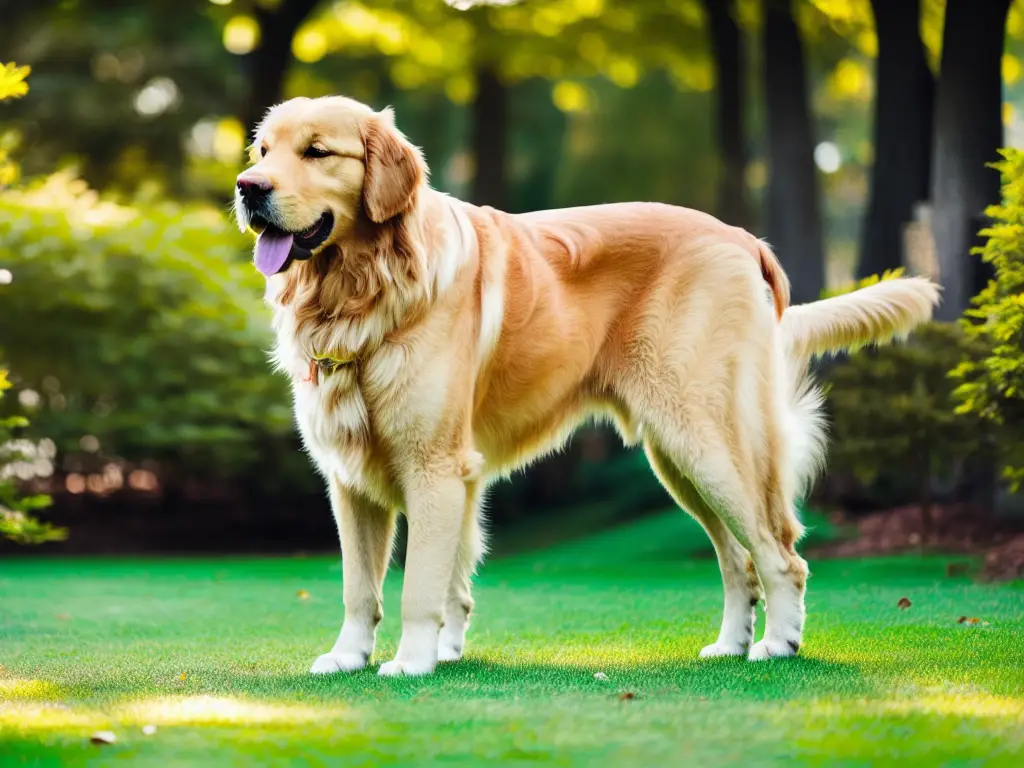
Whether you’re a seasoned Golden Retriever owner or considering bringing one of these golden-furred friends into your life, this comprehensive guide will equip you with the knowledge to navigate their energy levels and ensure your canine companion thrives. Let’s dive into the dynamic world of Golden Retrievers!
Table of Contents
- 1 Understanding the Energy Levels of Golden Retrievers
- 2 The Changing Energy Levels with Age
- 3 The Role of Exercise
- 4 Impact of Diet on Energy Levels
- 5 Hyperactivity vs. High Energy
- 6 Importance of Mental Stimulation
- 7 Calming Techniques for High-Energy Golden Retrievers
- 8 Related posts:
- 9 Do Golden Retrievers Bite
- 10 Are Golden Retrievers Loyal
- 11 Are Golden Retrievers Aggressive?
- 12 Golden Retriever Personality Guide
Understanding the Energy Levels of Golden Retrievers
Golden Retrievers are known for their friendly and tolerant attitudes; they are also vibrant and full of life. Originally bred as gun dogs to retrieve waterfowl for hunters, they naturally have a high degree of energy and enthusiasm, which carries into their current roles as family pets, service dogs, and agility champions.
When comparing the Golden Retrievers’ energy levels to other breeds, they are typically more energetic than others. Species such as Bulldogs and Basset Hounds have comparatively lower energy levels. Border Collies and Jack Russell Terriers might match Golden’s zest for life. Individual dogs can vary, but Golden Retrievers are known for their lively disposition as a breed.
However, separating myth from reality is essential when discussing Golden Retriever energy levels. One common myth is that all Golden Retrievers are incessantly energetic and can never be calm. While they have high energy levels, Goldens also have a balanced temperament and love their downtime as much as their playtime.
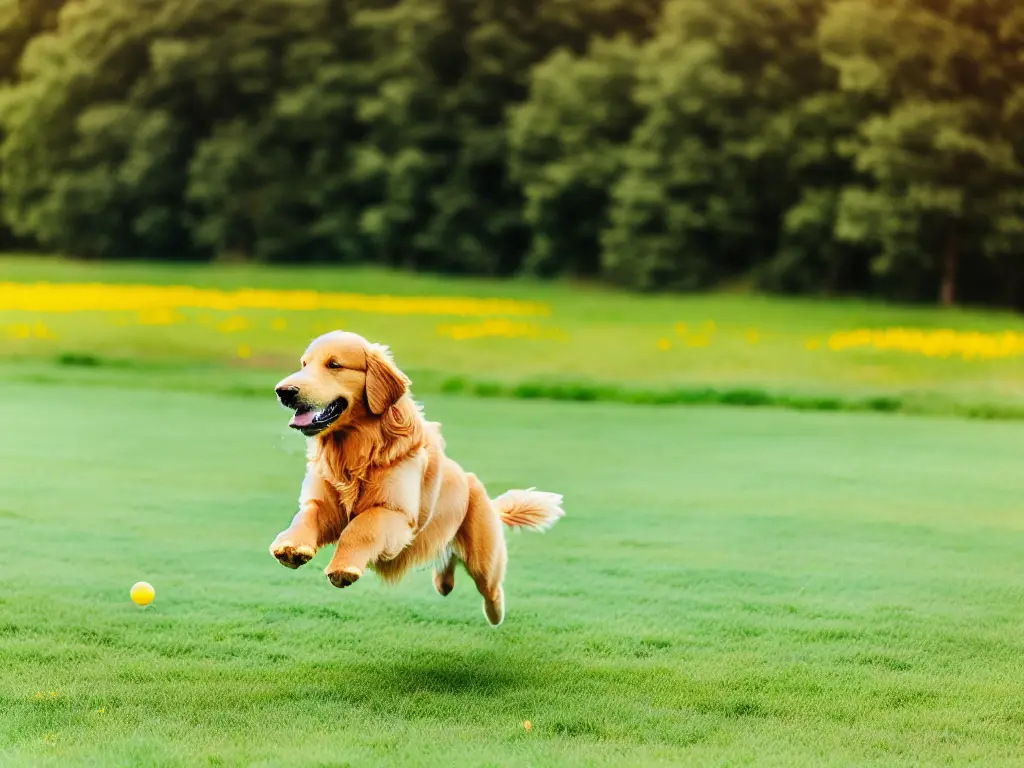
Another myth is that Golden Retrievers will naturally mellow as they grow from puppies into adults. While their energy does change and often decreases with age, adult and even senior Goldens typically remain playful and active compared to other breeds. As such, potential Golden Retriever owners must be prepared to provide ample exercise and stimulation throughout their pet’s life.
Understanding a Golden Retriever’s energy level is crucial for potential and current owners. It allows them to meet their furry friend’s needs, provide a healthier lifestyle, and forge a stronger bond with their pet. They also have an immense capacity for affection, loyalty, and calm companionship.
The Changing Energy Levels with Age
Just like humans, Golden Retrievers’ energy levels don’t remain constant throughout their life. They experience different stages of growth and development, each accompanied by a varying degree of energy and activity. Understanding these stages can help owners provide their beloved pets with the best care and attention.
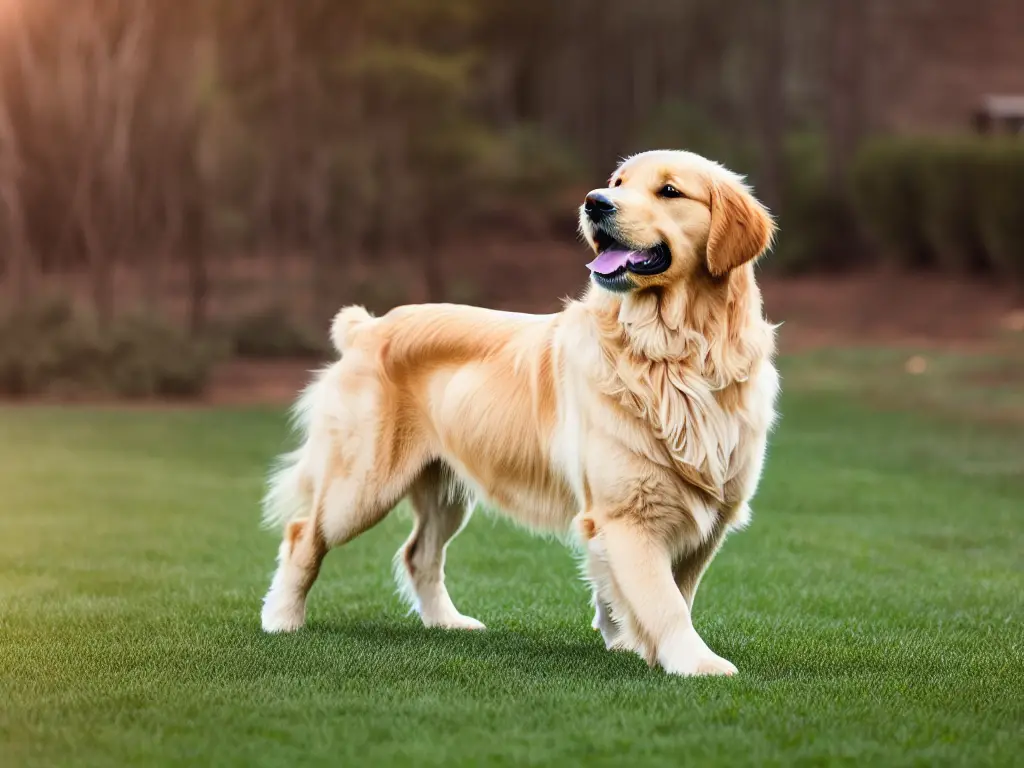
- Puppy Stage (0-12 months): Golden Retriever puppies are known for their high energy levels. They’re full of boundless enthusiasm and curiosity, always eager to explore their surroundings and play. During this phase, they may require several shorter play periods throughout the day, mixed with regular napping to accommodate their growth.
- Adolescent Stage (1-3 years): As Golden Retrievers move into adolescence, they continue to have high energy levels but may begin to show more extended periods of sustained activity. They’re still very playful at this age and need plenty of physical and mental stimulation to keep them occupied and satisfied. Regular, structured exercise becomes even more crucial in this phase.
- Adult Stage (3-8 years): A Golden Retriever’s energy level may decrease during adulthood, but they remain relatively high compared to many other breeds. They still require daily exercise to maintain their health and to help them expend energy, though they may not be as frantic as they were in their younger years.
- Senior Stage (8+ years): As Golden Retrievers enter their old years, their energy levels decrease. However, regular gentle exercises, such as short walks or light play, are still necessary to keep them fit and healthy. They also enjoy mental stimulation games to keep their minds sharp.
While noting these trends, remember that each Golden Retriever is unique. Some may maintain high energy levels well into their senior years, while others might become relaxed at a younger age. As a pet owner, staying attuned to your dog’s needs and adapting your care routine is the most important. You know your dog’s best, and you can provide the best life for your loyal companion.

The Role of Exercise
Golden Retrievers are active and fun-loving animals; they require lots of regular exercises to maintain their physical health and happiness. Exercise not only keeps a Golden fit, but it’s also a crucial way of expending energy and preventing the build-up of frustration or anxiety that can lead to destructive behaviors.
A healthy adult Golden Retriever typically needs at least an hour of exercise daily, but some may require more. It’s not just about letting them out in the yard; it’s about engaging them in activities that keep them moving and stimulate their minds.
Types of Exercise
- Walking or Running: A daily walk or jog is a fantastic exercise for Golden Retrievers. It provides physical activity and mental stimulation from various smells, sights, and sounds they encounter.
- Fetch Games: Golden Retrievers love to play fetch. Whether it’s a ball, Frisbee, or a stick, fetching helps them use their natural retrieving instincts and is an excellent way to burn off energy.
- Swimming: Originally bred as water dogs, most Golden Retrievers love swimming. It’s a low-impact exercise that’s easy on their joints while providing a good workout.
- Agility Training: Agility training can be a fun and challenging way to exercise your Golden. It engages their mind and body as they navigate through obstacle courses.
Balancing Exercise
It’s important to remember that while Golden Retrievers need plenty of exercise, balance is critical. Under-exercising a Golden can lead to obesity, related health issues, and behavioral problems due to excess energy. On the other hand, over-exercising, particularly in puppies, can result in joint and bone issues as their bodies are still growing.
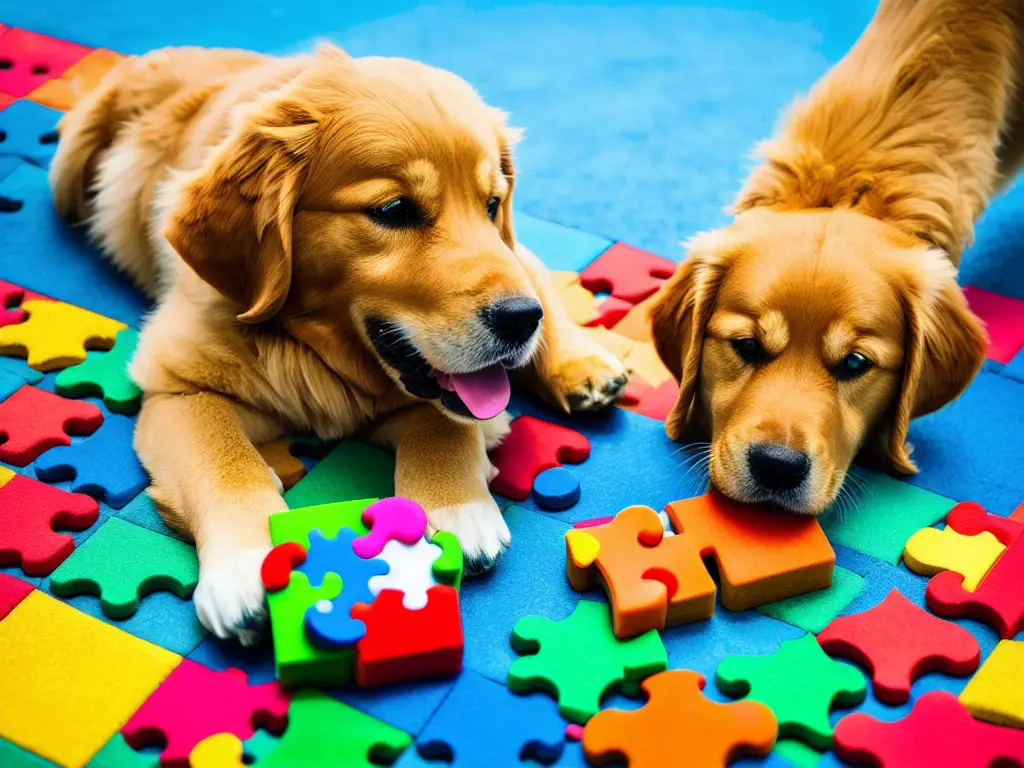
A sign of under-exercising might be that your Golden is overly energetic at home, has trouble calming down, or engages in destructive behaviors. Signs of over-exercising could be exhaustion, persistent panting, or reluctance to exercise.
Providing the right amount and type of exercise for your Golden Retriever helps ensure they lead a balanced, healthy, and happy life.
Impact of Diet on Energy Levels
Just as in humans, the diet of Golden Retrievers plays a significant role in determining energy levels. The right balance of nutrients gives your dog the energy they need to enjoy their day, while a poor diet can lead to lethargy, obesity, and other health issues.
Golden Retrievers should consume a balanced diet of proteins, carbohydrates, fats, vitamins, and minerals to maintain optimal energy levels.
- Proteins: Proteins are essential for energy, muscle development, and repair. Look for high-quality animal proteins like chicken, beef, or fish in your dog’s food.
- Carbohydrates: Carbs provide a source of quick energy. Whole grains, such as brown rice, oatmeal, vegetables, and fruits, are good carbs sources and supply fiber for healthy digestion.
- Fats: While too much fat can lead to weight gain, a certain amount is necessary for energy and to support overall health. Look for good sources of fats like fish oil or flaxseed in your dog’s food.
- Vitamins and Minerals: These are necessary for various body functions, including energy production, and should be included in a balanced diet.
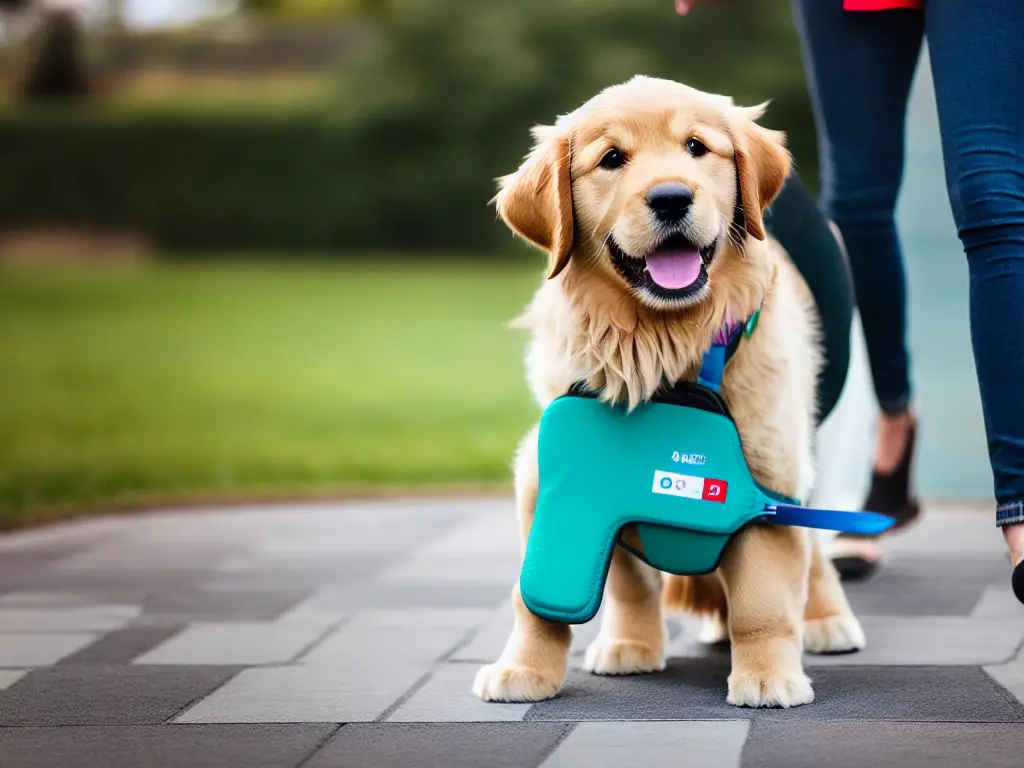
When it comes to feeding, portion control is also essential. Overfeeding can lead to weight gain, which can cause a decrease in energy levels and put extra strain on your dog’s joints and heart. On the other hand, underfeeding could leave your Golden Retriever lacking the energy they need to stay active and healthy.
Each dog’s dietary needs can vary based on age, weight, health status, and activity level, so it’s essential to consult your vet to determine the best diet for your dog.
Treats are also a part of many dogs’ diets but remember to offer them in moderation. While spoiling your Golden with treats is tempting, too many can contribute to weight gain. Choose healthy options, like carrot sticks or apple slices, to reward your dog.
Hyperactivity vs. High Energy
While Golden Retrievers are known for their high energy levels, distinguishing between healthy enthusiasm, and hyperactivity is essential. Understanding the difference can help positively channel your dog’s energy and prevent potential behavioral issues.
Signs of Hyperactivity
Hyperactivity in dogs refers to an abnormal and extreme level of activity and attention. Hyperactive dogs can be easily distracted, struggle to calm down, are often impulsive, and have difficulty focusing, even during training sessions.

Some signs of hyperactivity in Golden Retrievers might include:
- Constant movement and an inability to sit still when it’s appropriate.
- Excessive barking or whining.
- Destructive behaviors like chewing on furniture or digging.
- Difficulty focusing on tasks.
- Overreacting to stimuli (sounds, sights).
Causes of Hyperactivity
Several factors could lead to hyperactivity in dogs. In some cases, it may be a genetic predisposition. However, more often, it’s linked to environmental factors such as:
- Lack of exercise: Golden Retrievers may become hyperactive as they struggle to burn off their pent-up energy without sufficient physical activity.
- Poor diet: Diets high in sugar and carbohydrates can lead to spikes and crashes in energy levels, possibly contributing to hyperactivity.
- Lack of training: Some dogs may learn to control their impulses, leading to hyperactive behavior.
- Anxiety or stress: A dog may express it through hyperactivity if it feels stressed or anxious.
Managing Hyperactivity
If you suspect your Golden Retriever is hyperactive, it’s essential to consult with a professional. Veterinarians or animal behaviorists can offer guidance and strategies to manage hyperactivity, such as a structured exercise regime, a balanced diet, consistent training, and sometimes medication.
Remember, while Golden Retrievers are naturally energetic and enthusiastic, hyperactivity is not the norm. Understanding the difference and taking steps to manage it can help ensure your furry friend lives a balanced, happy life.
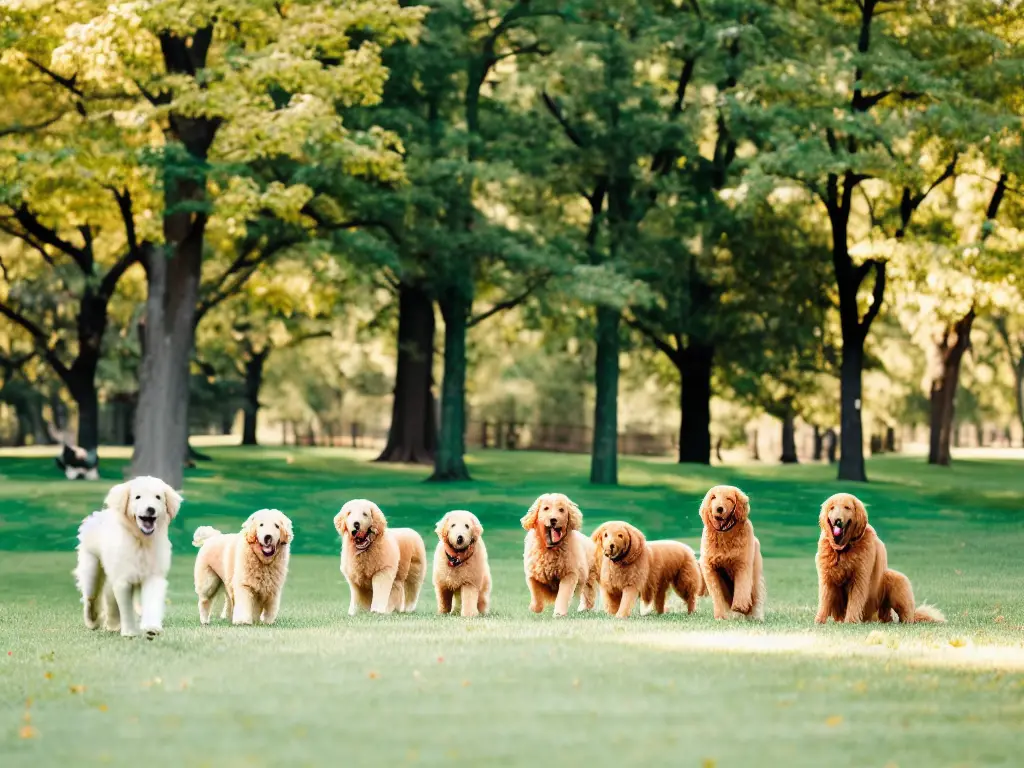
Behavioral Issues Related to Energy Levels
Golden Retrievers are known for their high energy levels, and if not adequately managed, this energy can sometimes lead to behavioral issues. Awareness of these potential problems and taking proactive steps to prevent them can help ensure your Golden leads a happy, balanced life.
- Destructive Behaviors: When a Golden Retriever doesn’t get enough exercise, it might resort to chewing furniture, digging holes, or other destructive behaviors to burn off its excess energy. Ensuring your dog gets enough physical and mental stimulation can help prevent these behaviors. Providing chew toys and using deterrents, like bitter sprays, can also help protect your belongings.
- Excessive Barking: Golden Retrievers might express their excess energy through incessant barking. If you notice your Golden is barking more than usual, it could be a sign they need more physical activity or mental stimulation.
- Hyperactivity: As previously mentioned, hyperactivity can be a behavioral issue linked to high energy levels. Hyperactive Golden Retrievers might have trouble focusing, be easily distracted, and struggle to sit still.
- Impulsive Behavior: High-energy dogs sometimes exhibit impulsive behavior, such as darting off during walks or jumping on people. Regular training sessions can help manage these behaviors by teaching you Golden impulse control.
- Anxiety: If a Golden Retriever doesn’t exercise enough, it may become anxious or stressed, leading to other behavioral issues like excessive licking or chewing on itself. Ensuring they get enough physical and mental stimulation can help alleviate this anxiety.
Preventing these behavioral issues ensures your Golden Retriever gets enough physical and mental exercise. Regular walks, play sessions, and training can help keep your dog’s energy levels in check. Additionally, keeping a consistent schedule can help your dog understand what to expect, reducing anxiety and helping them stay calm.

Remember, if your Golden Retriever starts exhibiting new or concerning behaviors, it’s always a good idea to consult a veterinarian or a professional dog trainer. They can help you understand why these behaviors occur and provide practical strategies to manage them.
Importance of Mental Stimulation
Golden Retrievers are not only physically active but are also brilliant dogs that require mental stimulation. Without adequate mental stimulation, they can become bored and develop behavioral problems, such as chewing, barking, or digging. Hence, along with physical exercise, mental exercise is crucial in managing a Golden Retriever’s energy levels.
Mental stimulation can come in many forms and often involves activities that engage a dog’s senses or challenge its problem-solving skills.
- Puzzle Toys: These are fantastic tools for mentally stimulating your Golden Retriever. Puzzle toys, where your dog has to figure out how to get to a treat, can keep them engaged for a long time. Examples include Kong toys, puzzle boards, and treat-dispensing balls.
- Training Sessions: Regular training sessions are excellent for mental stimulation. Learning new commands or tricks exercises your dog’s brain and strengthens your bond with them. Obedience training, agility training, or even teaching fun tricks can provide great mental workouts.
- Interactive Games: Games such as hide and seek, where your dog has to find you or a toy, can be enjoyable to challenge your Golden’s mind. You can also create an obstacle course in your backyard to give your dog a physical and mental challenge.
- Socialization: Meeting other dogs or people can also provide mental stimulation. Dog parks or playdates with other dogs give your Golden Retriever a chance to socialize, which can help keep its mind active.
- Scent Games: As Golden Retrievers were bred to retrieve games for hunters, they have a keen sense of smell. You can tap into this instinct by creating scent games, like hiding treats around the house or yard and having your dog find them.
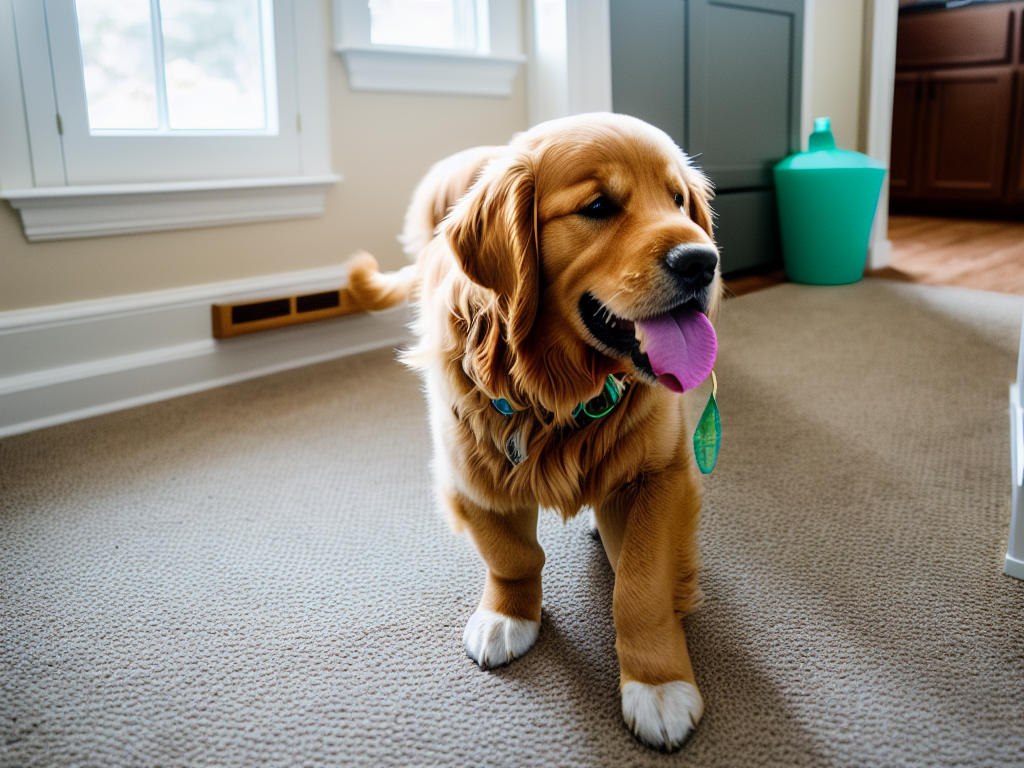
Remember, it’s all about balance. Dogs need physical exercise and mental stimulation to stay happy and healthy like humans. Incorporating these activities into your Golden Retriever’s routine can help manage their energy levels and keep their minds sharp.
Calming Techniques for High-Energy Golden Retrievers
Golden Retrievers are known for their boundless energy and joyous nature, but there may be times when it’s necessary to help your dog calm down. Whether during a visit to the vet, during a storm, or when they’re feeling anxious, the following techniques can prove helpful in managing their energy levels and creating a sense of calm.
- Regular Exercise: As mentioned throughout this article, exercise is vital in managing a Golden Retriever’s energy levels. A well-exercised dog is more likely to be calm during downtime.
- Training and Commands: Training your dog to respond to specific commands can be beneficial. Powers such as “sit,” “stay,” or “lie down” can teach your Golden Retriever to calm themselves on cue. Remember, consistency is vital in training, so regularly practice these commands.
- Create a Calm Environment: A peaceful home environment can help soothe your Golden Retriever. This could mean reducing loud noises, creating a designated quiet area for them with a comfortable bed, or playing calming music designed for dogs.
- Use Calming Aids: There are numerous calming aids available for dogs. These include calming sprays or diffusers that release dog-appeasing pheromones, weighted blankets or vests, and even specially designed-toys. Always consult with your vet before introducing new calming aids.
- Mental Stimulation: Keeping your Golden Retriever mentally stimulated can help calm them down. This could be through puzzle toys, training sessions, or games that challenge them mentally.
- Massage and Physical Contact: Many dogs find physical contact calming. Gentle stroking or a dog-specific massage can soothe your Golden Retriever. Just be sure to pay attention to their response to touch – some dogs may prefer not to be touched when anxious or over-excited.
- Consistent Routine: Dogs thrive on routine. Having consistent times for meals, walks, playtime, and rest can help your Golden Retriever feel more secure and calm.
Remember, what works for one dog may not work for another. Observing your Golden Retriever and trying different techniques to find what works best for them is crucial. If you’re struggling to calm your high-energy Golden Retriever, don’t hesitate to seek advice from a vet or professional dog trainer. They can provide personalized advice based on your dog’s needs and behaviors.

The journey with a Golden Retriever is active, full of adventures and shared experiences. By understanding and embracing their energy levels, you can make the most of this journey, channeling their enthusiasm into positive outlets and strengthening your bond with your golden-furred companion.
Remember, every dog is unique, and what works for one may not work for another. Regularly check in with your vet to ensure you’re meeting your Golden Retriever’s individual needs, and above all, enjoy the lively, loving spirit they bring into your life. Embrace the energy of your Golden Retriever, and you’ll have a loyal, joyful companion for life.